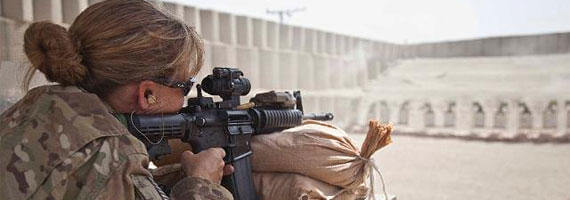My wife, like I would assume of most female servicemembers, is not your typical woman. She was made to be a soldier. She has the ability to put the mission first. I have total faith that, if needed, she would pull that trigger without hesitation. I believe under fire from enemy combatants, she would in fact be able to perform her job as a medic, and perform it well.
I do not, for one second, think she is not capable of handling the stress and mental fatigue that would come from being in a combat situation.
She is a highly trained American soldier.
But I doubt she has the upper body strength to carry a 200-plus pound man. I question whether she could ruck 12 miles a day, day after day, with 100 pounds or more strapped on her back.
When my wife was in the recruitment process of her enlistment into the Army I like to think it was a decision we made together. One reason I think that is because I was given the opportunity to talk with her recruiter on several occasions, and grilled him as best I could.
One of the questions I asked over and over again was what combat life would be like for her. I wanted to know how much danger she would be in. After all, this is my wife, the woman I vowed to protect.
The recruiter was fairly candid with me, explaining that America was in fact at war and no deployment comes without risk. As I pried him for more information I remember very well what he told me: "While she is a Combat Medic, she is a woman. And women are not allowed to serve in combat situations."
As our conversations went on regarding what her job would be, he kept emphasizing that because she is a woman, any "real" action would be highly unlikely. He insisted that most likely if/when she deployed she would be sent to a fairly large FOB and would either work in a hospital, clinic or aid station. He reiterated how large the FOB would be by saying there would be thousands, if not tens of thousands, of fellow servicemembers with her.
It was then I thought "OK. I know there are risks in joining the Army, but it sounds like ultimately she will be safe."
Fast forward nine months. Two months after graduating from AIT she deployed to Afghanistan. I wasn't too concerned with her deployment because, in the back of my mind, I remembered what the recruiter told me she was going to be doing over there. I knew she was deploying with an Infantry battalion. And I knew it wasn't going to be in the support capacity that most women who serve with an Infantry unit do.
But I don't think I was completely prepared for how disillusioned I was regarding what I thought her job was going to be and what it actually was.
After roughly one month of being on the FOB we found out exactly what she would be doing. She was part of a new initiative by the Army to bring female soldiers to better communicate with the local women of Afghanistan -- Cultural Support Team(CST). On a regular basis she would be going "outside the wire" and into the local communities, door to door, trying to befriend the locals.
Not only was she not going to be on a FOB with thousands of servicemembers in the way the recruiter had told me, she was not anywhere near a FOB. Instead she was at a camp with 20 other servicemembers.
This wasn't exactly the large force I thought she would be surrounded by.
Knowing where my wife was and what she was doing took some getting used to. There were several phone calls where she talked about coming under fire while on patrol. And while she wasn't rattled at all by the "combat," it scared the daylights out of me.
That was until I fully gave over to the thought that she is in fact a big girl. More importantly, she is a U.S. Soldier and this was what she signed up for.
Now that an announcement has been made that the ban will be lifted, one has to question what the definition of "combat" is and will be. The scope of what a woman can do to be considered "in combat" is not yet defined. I believe most of us who are doing our best to be informed on this topic believe that there will be restrictions -- restrictions that mean there is not any lesser requirements regarding physical abilities for the women than there is the men.
Our women are regularly in combat situations, only they are not recognized for it. Career advancement for many women has been hindered by the lack of recognition that women have had in our military. Awards and accolades that a man can get are not offered to women who may perform the same job, at the same time, on the same battlefield.
All because there was a rule that said women could not be in combat.
If you would have asked me if I was OK with my wife being in combat 2 years ago, I would have said HELL NO! But today, I say she is a soldier. Let her do her job. Let her decide if she wants to be in a "combat" profession. She, and all the other women who have taken the oath to serve, have said the same oath that the men have said and sworn to. Let them live by it.









